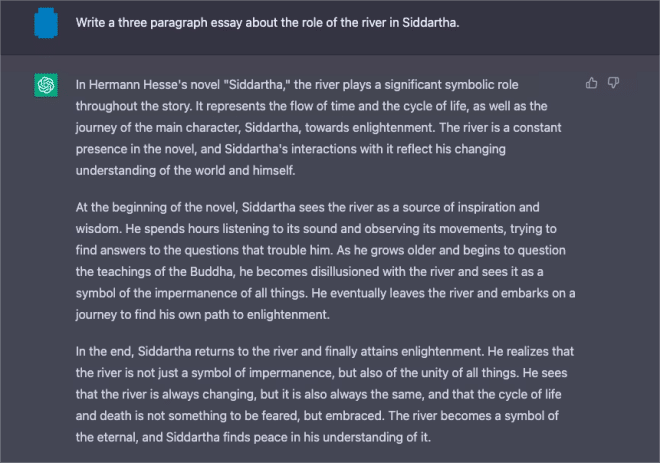Big problems with ChatGPT
ChatGPT is a powerful new artificial intelligence chatbot, but many people have
pointed out that it has some serious flaws. ChatGPT has made more than one mistake.
1. ChatGPT generates wrong answers
Unlike other AI
assistants like Siri, ChatGPT does not use the Internet to find answers. Instead, it
builds a sentence word by word and selects the next most likely "token" based on its
training. In other words, ChatGPT arrives at an answer through a series of guesses,
which is one of the reasons it can treat the wrong answer as completely correct.
While it is good at explaining complex concepts, making it a powerful
learning tool, it is important not to believe everything it says. ChatGPT is not
always correct - at least not yet.
2. ChatGPT has bias built into
its system
ChatGPT has been trained to write collectively about
past and present human beings around the world. Unfortunately, this means that the
same biases that exist in the real world can also appear in the model.
ChatGPT
has been shown to produce some terrible answers that discriminate against gender,
race, and minority groups, and OpenAI is trying to mitigate this discrimination.
One way to explain the problem is to point to the data as the problem,
blaming humans for the biases embedded on the Internet and elsewhere. But part of
the blame also lies with OpenAI, whose researchers and developers select the data
used to train ChatGPT.
Once again, OpenAI knows this is a problem, and says
they are addressing what they call "biased behavior" by collecting feedback from
users and encouraging them to flag bad ChatGPT output.
3. ChatGPT
may take jobs from humans
After the rapid development and
deployment of ChatGPT, the dust has not yet settled and the underlying technology
behind it has been stitched into many commercial applications. Among the apps that
have integrated GPT-4 are Duolingo and Khan Academy.
The former is a
language learning app and the latter is a diverse educational learning tool. Both
offer what is essentially an AI tutor, either in the form of an AI character that
you can talk to in the language you are learning. Or as AI mentors who can provide
tailored feedback on your learning.
On the one hand, this could change the
way we learn, potentially making education more accessible and the learning process
a little easier. But on the downside, it takes away jobs that have long been held by
humans.
Technological advances always lead to job losses, but the speed at
which AI is advancing means that multiple industries are facing the same problem.
From education to illustration to customer service roles, ChatGPT and its underlying
technology will completely reshape our modern world.
4. ChatGPT
impacts the education industry
You can ask ChatGPT to proofread
your text or point out how to improve a paragraph. Or, you can take yourself
completely out of the equation and let ChatGPT do all the writing work for you.
Teachers
have tried providing English assignments to ChatGPT and have received better answers
than many of their students could do. From writing cover letters to describing the
main themes of famous works of literature, ChatGPT can do it all without hesitation.

When students start using ChatGPT to help write essays, schools will have to come up
with answers quickly. The rapid deployment of artificial intelligence in recent
years is sure to rock many industries, and education is just one of them.
5. ChatGPT could be harmful to the real world
The
speed at which natural-sounding text is generated makes it easy for scammers to
impersonate people you know on social media. Likewise, discovering phishing emails
designed to extract sensitive details from you has been simplified. An added benefit
is that ChatGPT can generate text without grammatical errors - once a clear red
flag.
Dissemination of false information is also a serious concern, and the
scale of the text ChatGPT can generate, combined with the ability to make
misinformation sound convincing, is sure to make information on the Internet even
more suspect.
6. OpenAI holds all the power
With
great power comes great responsibility, and OpenAI has tremendous power. It is one
of the first AI companies to truly change the world with multiple generative AI
models, including Dall-E 2, GPT-3, and GPT-4.
OpenAI chooses which data to
use to train ChatGPT, but this information is not available to the public. We simply
do not know the details of how ChatGPT is trained, what data is used, where the data
comes from, or what the detailed architecture of the system looks like.
Ultimately,
we must blindly trust OpenAI to responsibly research, develop, and use ChatGPT, and
OpenAI will continue to develop ChatGPT according to its own goals and ethical
standards whether we agree with the methods or not.
Conclusion
There are many exciting things about
ChatGPT, but beyond its immediate uses, there are serious problems that deserve to
be understood. OpenAI acknowledges that ChatGPT can produce harmful and biased
answers, and hopes to mitigate this problem by gathering feedback from users. But
even if this were not the case, it generates compelling text that could easily be
exploited by people with malicious intent.
Using a brand new technology, it
is difficult to predict what problems will arise in the future. So while it may be
fun to use, make sure you don't believe everything ChatGPT says.